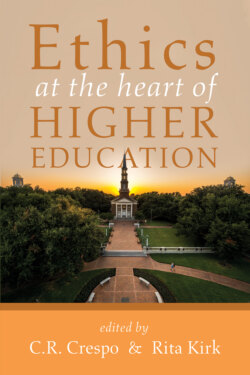Описание книги
With contributions from:
Mary Camp Alexander Cole Charles E. Curran Robert J. Howell D. Stephen Long Robin Lovin Richard O. Mason William F. May Thomas Wm. Mayo John Sadler

Реклама. ООО «ЛитРес», ИНН: 7719571260.
Ethics at the Heart of Higher Education
Contributors
Gratitudes
Table of Contents
Introduction
Can Ethics Be Taught? Connecting the Classroom to Everyday Life
Should Ethics Be Taught? Ethics in the Secular University
Christian Ethics, the University, and the Broader Human Society
STEM as a Calling
Using the Humanities to Explore Professionalism in Medical and Law Schools
Embedded Ethics in Medical Education
Sacred Spaces for Ethical Inquiry: Communicating Ideas on University Campuses
The Founding of an Ethics Center
Higher Education and Public Moral Discourse
Charter. The Cary M. Maguire Center for Ethics and Public Responsibility. Southern Methodist University
Bibliography
edited by C. R. Crespo and Rita Kirk
C. R. Crespo (MEd, Southern Methodist University) is the associate director of the Maguire Center for Ethics and Public Responsibility and an adjunct professor in the department of corporate communications and public affairs at Southern Methodist University. Her editing experience includes Annals of Dyslexia: An Interdisciplinary Journal of The International Dyslexia Association as well as other university publications. She completed the Management Development Program at the Harvard Graduate School of Education Institute for Higher Education. She oversees the operation of SMU’s Maguire Center for Ethics and Public Responsibility and focuses her work on higher education policy and administration. Her previous experience includes extensive work in communications at domestic and international nongovernmental organizations, and public affairs and policy research for Fortune 500 companies and national professional associations.
.....
Now we find teaching ethics, especially in a diverse context, to be veering into precarious territory; ethics has become inseparable from politics. When we ask students what is a well-lived life, they may give a diversity of answers, but with those answers also comes a tacit affirmation of the goodness of social orders and their arrangements. Students might suggest that the good life is one that pursues and achieves, wealth, honor, pleasure, or health. Thus, anything that discourages or impedes this pursuit is evil and anything that enhances it is good. From Aristotle to Aquinas, however, the pursuit of wealth, honor, pleasure or health was insufficient as an answer to what it means to be human because it could not lead to human flourishing. If students gave such an answer, they stood in need of correction. Perhaps Aristotle and Aquinas could make such a claim because they lived in societies in which there was a common conception of what human flourishing is. We do not, and for that reason making judgments on students’ answers to the question “what is a well-lived life?” is often perceived as inappropriate. How are we to proceed?
One way to do so is to let each student define his or her own answer to the question “What is a well-lived life?” without subjecting it to examination. Then the purpose of an ethics course is to encourage them to find the right means to achieve their end no matter what that end might be. This procedure is to my mind deeply flawed. Although it might appear to honor each student’s particular history and refuse to impose moral norms on them, it actually does the reverse. The assumption that ethics is about an autonomous decision to choose your own way of life and pursue it consistently is one ethical option among others. To assume that a course should proceed along these lines is to narrow down ethical possibilities, not expand them. It also neglects the inevitable link between ethics and politics. The answer to the question of a well-lived life will assume some underlying social formation that is worthy of our lives.
.....